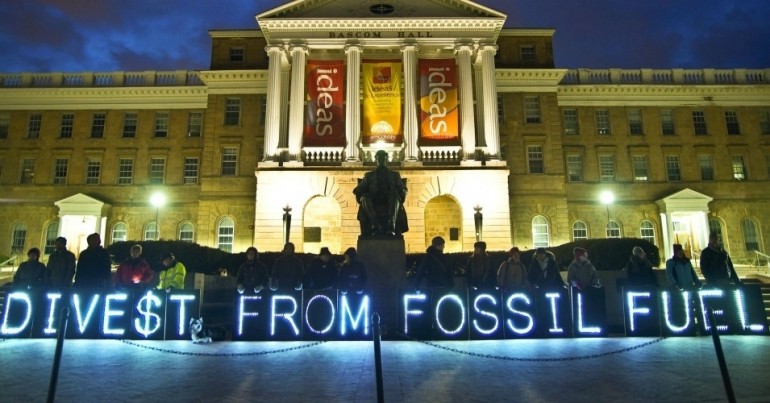Divest Harvard
– Artist’s Website –
“The accord coming out of Paris marks the beginning of the end for the fossil fuel industry.”
The fossil fuel divestment movement continued its momentum this week as students across the U.S. highlighted the need for their institutions to dump “support of global climate disaster, exploitation, and human suffering.”
On Tuesday, for example, four members of Divest Harvard were arrested after staging a sit-in at the Federal Reserve Bank building, where the Harvard Management Company, which manages that university’s endowment, is located.
That company “is the entity that actually does the day-to-day work investing in fossil fuel companies, so we thought it would be appropriate to take our message to this other important actor,” Harvard Law School student and Divest Harvard student Kelsey Skaggs, told the Crimson.
Another Harvard student, Jonathan Hiles, explained in a statement that, rather than divesting, his school “is making a large investment to support struggling fossil fuel companies and get them back to business as usual disrupting the climate. Harvard Management Company is contributing to the climate crisis even as it threatens to submerge parts of Boston within our lifetimes.”
Arrests—34 so far—also took place at the University of Massachusetts-Amherst, where students demanding fossil fuel divestment are on their fifth day of a sit-in.
Though university officials said this week that they’d support a divestment system, the climate campaigners are looking for a specific proposal for action.
“The president and the chairman have expressed support for divestment and we just want to make sure that they see the urgency that we do on this issue,” UMass sophomore Mica Reel told local 22News. “The fossil fuel industry is incredibly destructive, and it’s destroying the most marginalized communities and it’s also destroying communities around here.”
And at Columbia University, campaigners on Thursday began a sit-in to demand their school divest from fossil fuels.
Knowing their action violates the school’s rules of conduct, Columbia Divest for Climate Justice organizer Iliana Salazar-Dodge told the Columbia Spectator, “It’s up to [President Bollinger] to decide whether he wants to arrest or otherwise punish the students he’s supposed to represent and fight for. It’s either that, or he decides to stand up and lead in the face of climate change.”
Organizers also claimed a “partial victory” at Yale, which announced it was divesting $10 million in coal and tar sands investments out of its $25.6 billion endowment.
“Universities and people in power are starting to hear us, they’re starting to see us, they’re starting to listen.”
—Arabelle Schoenberg, Fossil Free Yale
It came, as Yale Daily News described it, “After years of dogged student advocacy.”
Arabelle Schoenberg of Fossil Free Yale said in a press statement, “It’s important to recognize this as a victory, and it is important that we keep fighting for what we believe in and don’t rest until we start to see concrete change at Yale. We are going to keep fighting until we divest the rest. Universities and people in power are starting to hear us, they’re starting to see us, they’re starting to listen.”
In an other bright spot for the movement, University of Mary Washington announced that, after years of student campaigning, it was limiting its endowment’s fossil fuel investments, with a goal of 98 percent divestment.
The actions this week come just ahead of a climate mobilization called Break Free, which organizers describe as “A global wave of mass actions [that] will target the world’s most dangerous fossil fuel projects, in order to keep coal, oil and gas in the ground and accelerate the just transition to 100% renewable energy.”
As UMass AMherst student Sarah Jacqz wrote at Common Dreams this week, “The accord coming out of Paris marks the beginning of the end for the fossil fuel industry.”
“The time for action is now,” she wrote.






